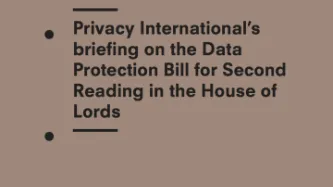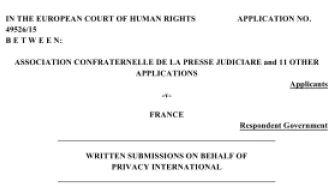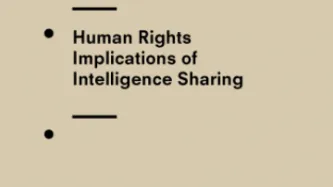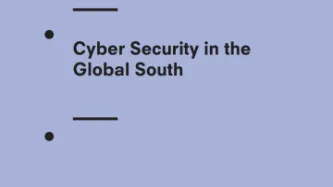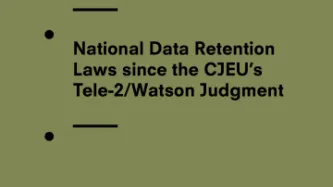Advanced Search
Content Type: News & Analysis
We found this image here.
On 11 October, the LIBE Committee of the European Parliament votes on the draft e-privacy regulation. As the landscape of generation, collection, and other processing of data in the digital sphere evolves, the proposal seeks to update the rules on confidentiality and security of electronic communications and online activities.
Unsurprisingly, companies whose business models rely on tracking individuals online have been busy lobbying against the new regulation. The…
Content Type: Advocacy
Privacy International welcomes the aim of this Bill (Data Protection Bill), “to create a clear and coherent data protection regime”, and to update the UK data protection law, including by bringing the EU General Data Protection Regulation (GDPR) and the Data Protection Law Enforcement Directive (DPLED) - into the UK domestic system. This is Privacy International’s briefing on the Data Protection Bill for second reading in the House of Lords
Content Type: Press release
On 5 October 2017, Privacy International will appear before the UK Court of Appeal to continue its challenge to the British government's large scale hacking powers. The case questions the decision by the Investigatory Powers Tribunal (IPT) to sanction the UK government's power to hack broad categories of people or property without any individualised suspicion.
TIMELINE AND KEY POINTS
- Privacy International began fighting bulk government hacking in 2014 at the…
Content Type: Press release
While welcoming the objective of the Bill, Privacy International has sent a briefing to the House of Lords and a letter to Minister of State for Digital, Matt Hancock MP, outlining key concerns and recommendations. The Bill's stated aim is “to create a clear and coherent data protection regime”, and to update the UK data protection law, including by bringing the EU General Data Protection Regulation (GDPR) and the Data Protection Law Enforcement Directive (DPLED) - into the UK domestic system.…
Content Type: People
Barry was a long-time trustee of Privacy International, up until his term ended in September 2017. In recognition of his substantial contribution to PI, the Board of Trustees designated him as Trustee Emeritus.
Barry was the Director of the American Civil Liberties Union's Program on Technology and Liberty. Prior to leading that programme, Barry served as Associate Director of the ACLU.
He has advocated tirelessly for privacy and information technology issues, speaking to audiences…
Content Type: People
Anna was a long-time trustee of Privacy International, up until her term ended in September 2017. In recognition of her substantial contribution to PI, the Board of Trustees designated her as Chair Emeritus.
She has been a consumer and privacy advocate for many years, after having trained as a classics scholar and spending a stint as a travel reporter and editor, working for Which?, the UK consumer organisation. She is currently senior policy advisor to the Transatlantic Consumer Dialogue (…
Content Type: Explainer
What is integrated policing?
Integrated policing is the collection and centralisation of data used for policing purposes. In the era of ‘big data’, companies – often the same companies offering infrastructures for smart cities – are offering interfaces that allow police easier access to datasets. Smart cities are cities where projects are deployed to use the collection and analysis of data to attempt to provide better targeted services to inhabitants.
With the proliferation of surveillance…
Content Type: News & Analysis
This blog was written by Fundación Karisma, a member of the Privacy International Network. It does not necessarily reflect the views or position of Privacy International.
The Colombian General Prosecutor said recently that the blocking of IMEI is not working. He is talking about a registry created in 2011 that aims to reduce cellphone theft by blocking reportedly stolen phones of Colombian networks.
Fundación Karisma has been following this program and now, after six years…
Content Type: Long Read
European Court of Human Rights Intervention
On 15 September 2017, Privacy International filed an intervention to the European Court of Human Rights in Association Confraternelle de la Presse Judiciare and 11 Other Applications v. France. This case challenges various surveillance powers authorised under the French Intelligence Act of 24 July 2015 as incompatible with Articles 8 and 10 of the European Convention on Human Rights, which respectively protect the right to privacy…
Content Type: Advocacy
On 13 September 2017, Privacy International, in partnership with 30+ national human rights organisations, launched an international campaign for greater transparency around secretive intelligence sharing activities between governments. As part of this campaign, PI wrote to national intelligence oversight bodies in over 40 countries seeking information about the intelligence sharing activities of their governments. PI has created an interactive map which illustrates the countries…
Content Type: Report
In this paper, Privacy International explores* what it means to be secure, and how governments and companies enact policies and laws that undermine security globally. Good cyber security policies and practices put people and their rights at the centre. By prioritising the individual and protecting people, devices and networks, governments could take advantage of a real opportunity - to give something technically complex a human element. In short, giving the tin man a heart.
*This…
Content Type: Long Read
Content Type: Press release
Key points
Privacy International surveyed 21 EU member states' legislation on data retention and examined their compliance with fundamental human rights standards
0 out of the 21 States examined by PI are currently in compliance with these standards (as interpreted in two landmark judgements by the Court of Justice of the European Union: Tele-2/Watson and Digital Rights Ireland)
Privacy International is calling for:
EU member states to review their legislation on data retention…
Content Type: Advocacy
This report sheds light on the current state of affairs in data retention regulation across the EU post the Tele-2/Watson judgment. Privacy International has consulted with digital rights NGOs and industry from across the European Union to survey 21 national jurisdictions (Austria, Belgium, Bulgaria, Croatia, Cyprus, Czech Republic, France, Germany, Hungary, Ireland, Italy, Luxembourg, the Netherlands, Poland, Portugal, Romania, Slovakia, Slovenia, Spain, Sweden, and the United…
Content Type: Case Study
Cities around the world are deploying collecting increasing amounts of data and the public is not part of deciding if and how such systems are deployed.
Smart cities represent a market expected to reach almost $760 billion dollars by 2020. All over the world, deals are signed between local governments and private companies, often behind closed doors. The public has been left out of this debate while the current reality of smart cities redefines people’s right to privacy and creates new…
Content Type: Case Study
For those concerned by reporting of Facebook’s exploitation of user data to generate sensitive insights into its users, it is worth taking note of WeChat, a Chinese super-app whose success has made it the envy of Western technology giants, including Facebook. WeChat has more than 900 million users. It serves as a portal for nearly every variety of connected activity in China. Approximately 30% of all time Chinese users spend on the mobile internet centers around…
Content Type: Case Study
Our connected devices carry and communicate vast amounts of personal information, both visible and invisible.
What three things would you grab if your house was on fire? It’s a sure bet your mobile is going to rank pretty high. It’s our identity, saying more about us than we perhaps realise. It contains our photos, calendar, internet browsing, locations of where we go, where we’ve been, our emails, social media. It holds our online banking, notes with half written poems, shopping lists, shows…
Content Type: Case Study
As society heads toward an ever more connected world, the ability for individuals to protect and manage the invisible data that companies and third parties hold about them, becomes increasingly difficult. This is further complicated by events like data breaches, hacks, and covert information gathering techniques, which are hard, if not impossible, to consent to. One area where this most pressing is in transportation, and by extension the so-called ‘connected car’.
When discussing connected…
Content Type: Case Study
Political campaigns around the world have turned into sophisticated data operations. In the US, Evangelical Christians candidates reach out to unregistered Christians and use a scoring system to predict how seriously millions these of voters take their faith. As early as 2008, the Obama campaign conducted a data operation which assigned every voter in the US a pair of scores that predicted how likely they would cast a ballot, and whether or not they supported him. The campaign was so confident…
Content Type: Case Study
Financial services are collecting and exploiting increasing amounts of data about our behaviour, interests, networks, and personalities to make financial judgements about us, like our creditworthiness.
Increasingly, financial services such as insurers, lenders, banks, and financial mobile app startups, are collecting and exploiting a broad breadth of data to make decisions about people. This is particularly affecting the poorest and most excluded in societies.
For example, the decisions…
Content Type: Case Study
Gig economy jobs that depend on mobile applications allow workers’ movements to be monitored, evaluated, and exploited by their employers.
The so-called “gig economy” has brought to light employers’ increasing ability and willingness to monitor employee performance, efficiency, and overall on-the-job conduct. Workplace surveillance of gig economy workers often happens without employees’ awareness or consent. This is especially evident in the app-based gig economy, where apps act both as an…
Content Type: Case Study
Police and security services are increasingly outsourcing intelligence collection to third-party companies which are assigning threat scores and making predictions about who we are.
The rapid expansion of social media, connected devices, street cameras, autonomous cars, and other new technologies has resulted in a parallel boom of tools and software which aim to make sense of the vast amount of data generated from our increased connection. Police and security services see this data as an…
Content Type: Case Study
Introduction
Online, and increasingly offline, companies gather data about us that determine what advertisements we see; this, in turn, affects the opportunities in our lives. The ads we see online, whether we are invited for a job interview, or whether we qualify for benefits is decided by opaque systems that rely on highly granular data. More often than not, such exploitation of data facilitates and exacerbates already existing inequalities in societies – without us knowing that it occurs.…
Content Type: News & Analysis
Privacy International and Metamorphosis have today written to authorities in Macedonia to provide information and call for assurances regarding government surveillance in Macedonia.
For over two years, Macedonia has endured a prolonged and severe political crisis - including wide scale protests and acts of violence against parliamentarians - following reports that the governing party had been unlawfully intercepting the phone calls of some 20,000 people, including, activists, journalists…
Content Type: Advocacy
Privacy International and Metamorphosis have today written to authorities in Macedonia to provide information and call for assurances regarding government surveillance in Macedonia.
For over two years, Macedonia has endured a prolonged and severe political crisis - including wide scale protests and acts of violence against parliamentarians - following reports that the governing party had been unlawfully intercepting the phone calls of some 20,000 people, including,…
Content Type: Long Read
This piece was originally published in Just Security in August 2017
We recently published an analysis in Lawfare of the United Kingdom’s surveillance framework as it relates to the proposed U.S.-U.K. agreement for cross-border law enforcement data requests. Implementing the U.S.-U.K. agreement is subject to passage of draft legislation proposed by the Justice Department to Congress in July 2016 (“U.S. DOJ legislation”), which will set standards that approved partners like the U.K.…
Content Type: News & Analysis
What do Honduras, Pakistan, and Switzerland have in common? They are all bound to respect and protect the right to privacy under Article 17 of the International Covenant on Civil and Political Rights. And in July 2017, they all also happened to be under the scrutiny of the UN Human Rights Committee, which found the countries’ human rights record wanting in many respects, including the scope of their surveillance legislation.
Intelligence sharing
Reviewing Pakistan, the Committee…
Content Type: Legal Case Files
A skeleton argument is a document produced for the court. It is more usually produced as a means of presenting the skeleton or ‘bare bones’ of a case before a trial.
The skeleton arguments cross-reference documents in the bundles. There is a consolidated index here: [Consolidated Index]
References in the form [Bundle/Tab/Page] are to the following bundles:
Bundles used for the July 2016 hearing, namely ‘Core’ and bundles numbered consecutively 1 to 5
Supplemental bundle prepared for the…
Content Type: News & Analysis
Privacy International (PI) has today written to the Danish Ministry of Foreign Affairs following further concerning reports about the export of internet surveillance equipment from the country.
We are calling for the government to carry out a full re-assessment of the human rights risks associated with the export of such internet surveillance equipment, and to revoke all licenses where there is a risk to human rights or if the law governing surveillance in the destination country is…

